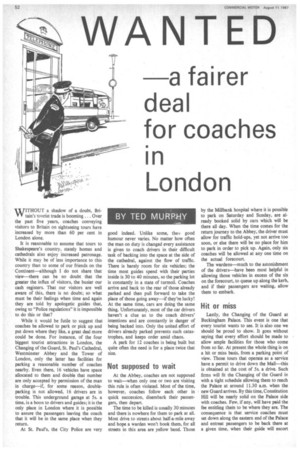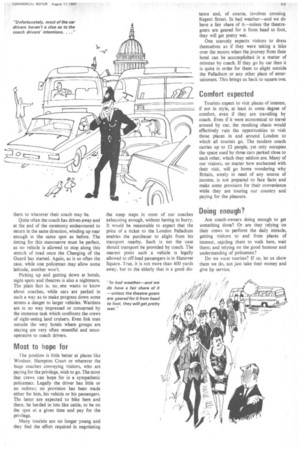WANTED
Page 54

Page 55

If you've noticed an error in this article please click here to report it so we can fix it.
—a fairer deal for coaches in London
WITHOUT a shadow of a doubt, Britain's tourist trade is booming .. . Over the past five years, coaches conveying visitors to Britain on sightseeing tours have increased by more than 60 per cent in London alone.
It is reasonable to assume that tours to Shakespeare's country, stately homes and cathedrals also enjoy increased patronage. While it may be of less importance to this country than to some of our friends on the Continent—although I do not share that view—there can be no doubt that the greater the influx of visitors, the busier our cash registers. That our visitors are well aware of this, there is no doubt; so what must be their feelings when time and again they are told by apologetic guides that, owing to "Police regulations" it is impossible to do this or that?
While it would be futile to suggest that 'coaches be allowed to park or pick up and put down where they like, a great deal more could be done. For instance, of the four biggest tourist attractions in London, the Changing of the Guard, St. Paul's Cathedral, Westminster Abbey and the Tower of London, only the latter has facilities for parking a reasonable number of coaches nearby. Even there, 16 vehicles have space allocated to them and double that number are only accepted by permission of the man in charge—if, for some reason, doubleparking is not allowed, 16 drivers are in trouble. This underground garage at 5s. a time, is a boon to drivers and guides; it is the only place in London where it is possible to assure the passengers leaving the coach that it will be in the same place when they return.
At St. Paul's, the City Police are very good indeed. Unlike some, the.1 good humour never varies. No matter how often the man on duty is changed every assistance is given to coach drivers in their difficult task of backing into the space at the side of the cathedral, against the flow of traffic. There is barely room for six vehicles; the time most guides spend with their parties inside is 30 to 40 minutes, so the parking lot is constantly in a state of turmoil. Coaches arrive and back to the rear of those already parked and then pull forward to take the place of those going away—if they're lucky! At the same time, cars are doing the same thing. Unfortunately, most of the car drivers haven't a clue as to the coach drivers' intentions and are constantly in danger of being backed into. Only the united effort of drivers already parked prevents such catastrophes, and keeps order amid chaos.
A park for 12 coaches is being built but quite often the need is for a place twice that size.
Not supposed to wait
At the Abbey, coaches are not supposed to wait—when only one or two are visiting this rule is often violated. Most of the time, however, coaches follow each other in quick succession, disembark their passengers, then depart.
The time to be killed is usually 30 minutes and there is nowhere for them to park at all. Most drive to streets about half-a-mile away and hope a warden won't book them, for all streets in this area are yellow band. Those by the Millbank hospital where it is possible to park on Saturday and Sunday, are already booked solid by cars which will be there all day. When the time comes for the return journey to the Abbey, the driver must allow for traffic hold-ups, yet not arrive too soon, or else there will be no place for him to park in order to pick up. Again, only six coaches will be allowed at any one time on the actual forecourt.
The wardens—much to the astonishment of the drivers—have been most helpful in allowing those vehicles in excess of the six on the forecourt, to queue up along the kerb, and if their passengers are waiting, allow them to embark.
Hit or miss
Lastly, the Changing of the Guard at Buckingham Palace. This event is one that every tourist wants to see. It is also one we should be proud to show. It goes without saying that every effort should be made to allow ample facilities for those who come from so far. At present the whole thing is on a hit or miss basis, from a parking point of view. Those tours that operate as a service have a permit to drive down the Mall—this is obtained at the cost of 5s. a drive. Such firms will fit the Changing of the Guard in with a tight schedule allowing them to reach the Palace at around 11.30 a.m. when the new Guard arrives. By this time, Constitution Hill will be nearly solid on the Palace side with coaches. Few, if any, will have paid the fee entitling them to be where they are. The consequence is that service coaches must set down along the eastern end of the Palace and entreat passengers to be back there at a given time, when their guide will escort them to wherever their coach may be.
Quite often the coach has driven away and at the end of the ceremony endeavoured to return in the same direction, winding up near enough in the same spot as before. The timing for this manouevre must be perfect, as no vehicle is allowed to stop along this stretch of road once the Changing of the Guard has started. Again, as is so often the case, while one policeman may allow some latitude, another won't.
Picking up and putting down at hotels, night-spots and theatres is also a nightmare. The plain fact is, no, one wants to know about coaches, while cars are parked in such a way as to make progress down some streets a danger to larger vehicles. Wardens are in no way impressed or concerned by the immense task which confronts the crews of sight-seeing land cruisers. Even link men outside the very hotels where groups are staying are very often resentful and uncooperative to coach drivers.
Most to hope for
The position is little better at places like Windsor. Hampton Court or wherever the huge coaches conveying visitors, who are paying for the privilege, wish to go. The most that crews can hope for is a sympathetic policeman. Legally the driver has little or no redress; no provision has been made either for him, his vehicle or his passengers. The latter are expected to hike here and there, be herded in lots like cattle, to be on the spot at a given time and pay for the privilege.
Many tourists are no longer young and they find the effort required in negotiating the steep steps in most of our coaches exhausting enough, without having to hurry. It would be reasonable to expect that the price of a ticket to the London Palladium enables the purchaser to alight from his transport nearby. Such is not the case should transport be provided by coach. The nearest point such a vehicle is legally allowed to off-load passengers is in Hanover Square. True, it is not more than 400 yards away, but to the elderly that is a good dis tance and, of course, involves crossing Regent Street. In bad weather—and we do have a fair share of it—unless the theatregoers are geared for it from head to foot, they will get pretty wet.
One scarcely expects visitors to dress themselves as if they were taking a hike over the moors when the journey from their hotel can be accomplished in a matter of minutes by coach. If they go by car then it is quite in order for them to alight outside the Palladium or any other place of entertainment. This brings us back to square one.
Comfort expected
Tourists expect to visit places of interest, if not in style, at least in some degree of comfort. even if they are travelling by coach. Even if it were economical to travel around by car, the resulting chaos would effectively ruin the opportunities to visit those places in and around London to which all tourists go. The modern coach carries up to 52 people, yet only occupies the space used by three cars parked close to each other, which they seldom are. Many of our visitors, no matter how enchanted with their visit, will go home wondering why Britain, sorely in need of any source of income, is not prepared to face facts and make some provision for their convenience while they are touring our country and paying for the pleasure.
Doing enough?
Are coach-owners doing enough to get something done? Or are they relying on their crews to perform the daily miracle, getting visitors to and from places of interest, cajoling them to walk here, wait there; and relying on the good humour and understanding of policemen?
Do we want tourists? If so, let us show them we do, not just take their money and give lip service.












































































































